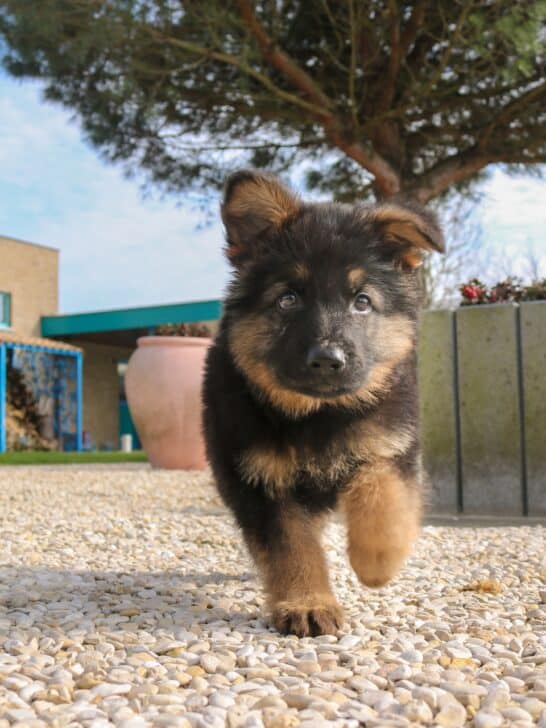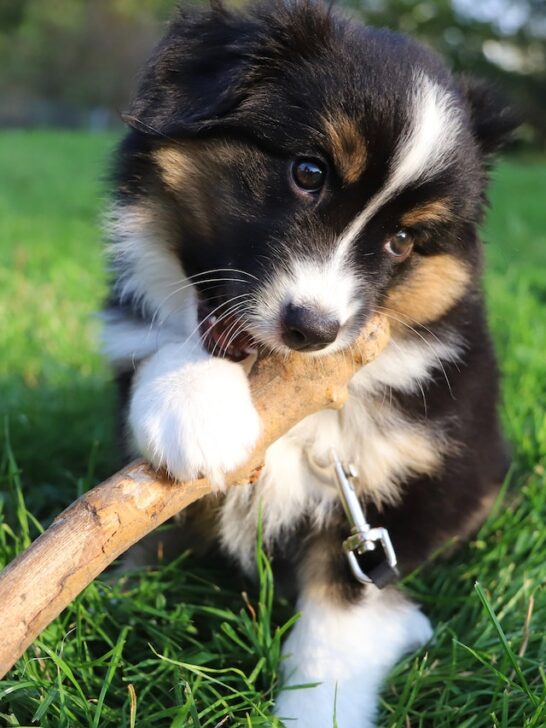Why Are German Shepherds Good Police Dogs?
German Shepherds are truly amazing dogs, but on top of the fact that they make great pets, they also make excellent police dogs.
They are one of the most commonly used breeds of dogs when it comes to police work, and there are various different reasons for this.
This is a loyal and loving breed that has high energy levels and loves to be kept mentally stimulated to avoid boredom.
These are just some of the reasons why they make such great police companions, but there are many more than this.
The police actually train German Shepherds as police dogs for a variety of different applications, and this is something that we are going to look at in this article.
We are also going to discover exactly why German Shepherds are such good police dogs, and the different ways that they are used by police departments.
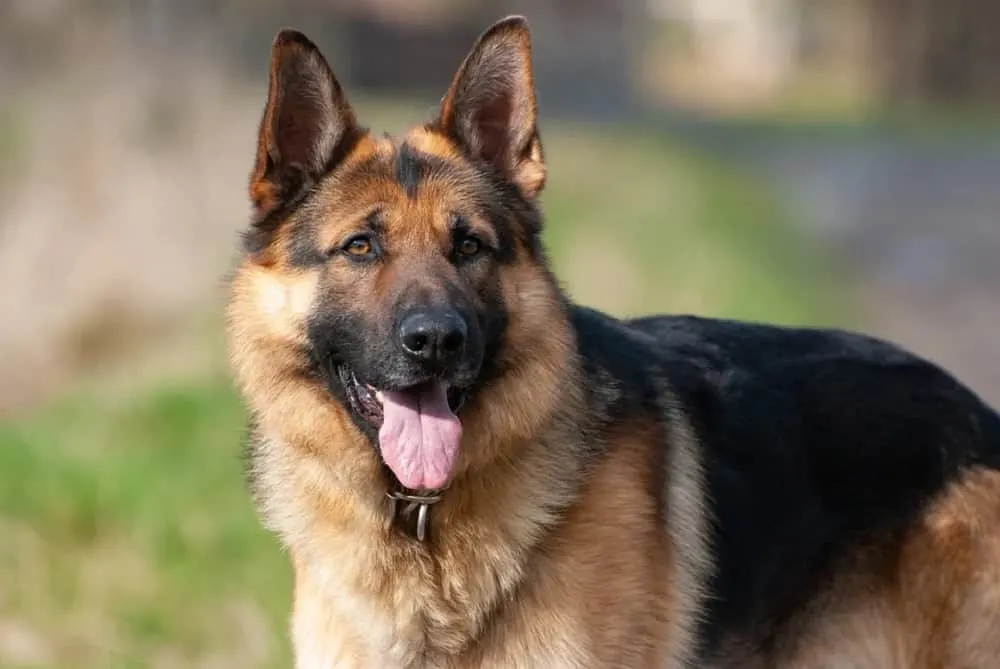
The Job of a Police Dog
Police officers have a difficult and dangerous job that provides different scenarios every day, and they are sometimes faced with life or death situations.
These types of situations will usually involve people that are intent on causing harm to them or another person.
Even though police officers are armed with a variety of defensive tools for these situations, like a gun, taser, or baton, this isn’t always going to be enough for every situation.
They may be faced with multiple aggressors, or there may simply come a time when the officer is taken by surprise and ends up in a tricky situation.
In different circumstances, a police officer may have to conduct a search in an area that is too narrow, or that is difficult to access.
As well as this, there will be certain situations where the thing that is being searched for cannot be detected by human senses.
These are just some of the situations where the police dog will come in to save the day, and this is especially common with German Shepherd dogs.
As well as many other things, they are one of the most effective and efficient tools that a police officer can utilize when needed, and they just love to help out and do a good job.
Reasons Why German Shepherds Make Good Police Dogs
There are actually lots of reasons why German Shepherd dogs make such good police dogs, and we are going to explain some of them here for you.
One of the first reasons why German Shepherds make such good police dogs is because they are one of the most intelligent breeds of dog, which makes them more than capable for the task at hand.
As well as this, they are able to work long hours without getting tired, and as herding dogs, it is only natural for them to want to protect.
German Shepherds are a dog breed that has above-average strength, and they even have the ability to keep calm in difficult situations.
In addition to this, they are really good at following commands, and they are both quick and athletic, which are two qualities that any good police officer will need.
Finally, these dogs are extremely loyal, and they will always have your back when you need them to.
These dogs will be given lots of training to make them fit for police work, from learning when to step in to help to learning how to become an excellent tracker, or being able to sniff out illegal substances.
Matching a Dog With Their New Partner
German Shepherds are equally as important as the people that they are matched with, and due to this, police dogs are actually matched with their handlers based on their personality.
The matching process is far from simple, and it can actually take several weeks for a police dog to be properly matched with its new handler.
The officers will have to go through a lengthy training process to ensure that they are able to train the dog well, and a police officer will only become eligible to transfer to a specialty K-9 unit for training after completing at least one or two years of patrol service.
The exact length of time will depend on the specific department.
As well as all of this, the police officer’s prior career life will usually be assessed, and some of the questions that will be asked about the police officer can include:
- How familiar is the officer with canines in their day-to-day life?
- Is the officer very physically active on the job?
- Has the officer demonstrated an active role in inserting themselves immediately to handle adverse situations?
- Has the officer actively taken on people and problems?
- Is the officer generally responsible?
- Does the officer possess good communication skills?
It is also really important that the officer that is being matched with the German Shepherd is energetic by nature.
This is because German Shepherd police dogs are highly active and energetic, and they will need the same from their handlers.
In a police officer’s eyes, a police dog is not a pet, but they are also not simply considered as a tool or weapon.
They have a very unique role that requires a specific type of officer, and they could be considered partners.
The dog will go to live with their new partner in their homes along with the officer’s family, which helps to create a strong bond that will develop between them.
However, when most people leave their dogs at home and say goodbye at the door, K-9 unit officers take their dog to work with them.
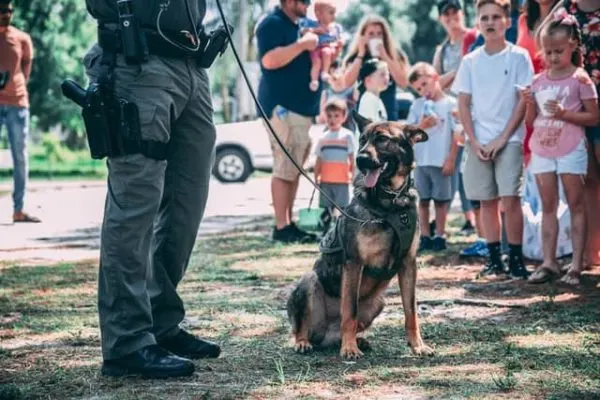
Rewarding a Police Dog
This is a situation that you might have seen before on TV, and it involves a German Shepherd police dog being deployed to either chase down a threat or discover hidden contraband or explosives.
In these situations, you may have noticed that when the dog has successfully completed their task, they will be rewarded with both verbal praise and often some type of toy for them to play with.
This is something that happens in reality with dogs on the police force.
This reward is given as police dogs love to play and this is actually an aspect that their training is based upon.
These dogs are highly motivated to do their work due to the reward that they will receive after doing a good job.
This is referred to as positive reinforcement, which means that the dog is positively rewarded for doing their job well. This is a great motivator for getting a dog to go to work.
Something that you might be interested to learn is that throughout their training, dogs are often given towels as something for them to play with, and they will fetch it or tug on it.
However, there is usually an ulterior motive behind this. The towel creates a fun object for the dog to play with, but it will usually be covered in a specific scent, like gun residue or a certain narcotic.
This will allow the dog to associate the scent on the towel with their toy and playtime. So, when the dog finds what it is supposed to be looking for, playtime ensues.
How a Police Dog is Chosen
Choosing a police dog usually requires looking for a dog that has a high natural prey drive, and breeders will sometimes begin testing and training entire litters of puppies when they are just 6 weeks old.
During this time, they are looking out for puppies that display signs of this kind of drive.
Another technique that breeders can use to select dogs that will be suitable for police training involves a ball that will be rolled underneath a couch or other object.
Puppies will usually attempt to get it, based on their natural instincts, but there are some puppies that will lose interest and give up on the ball if they are offered something that they find to be more interesting.
A puppy that has a natural prey drive will be very persistent in trying to get the ball, and it will not give up until it has the ball in its possession.
They will be focused on the target until they achieve the result they are hoping for. This is something that you could try at home with your puppy to see how they respond.
This is a great way to gauge how much of a natural prey drive your puppy has.
This can even become useful in the future when it comes to introducing your German Shepherd to other people and animals.
If your dog does have a higher prey drive, then you will know that you may need some extra caution when you are socializing them.
Does it Take a Long Time to Train a Police Dog?
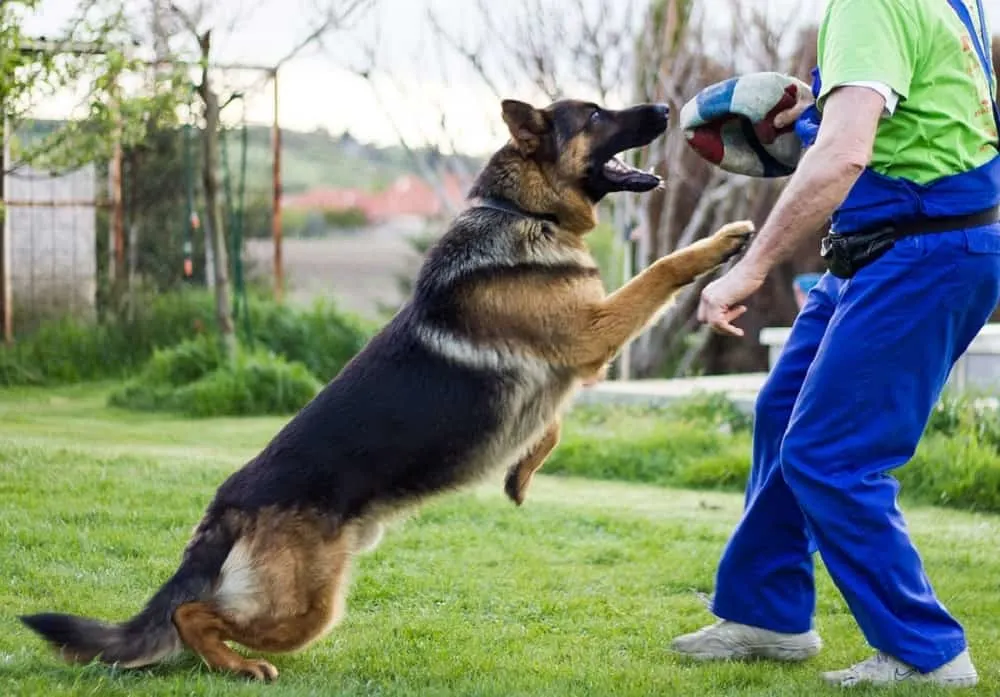
The amount of time that it takes to fully train a police dog will depend on how the dog is going to be used on the force.
More often than not, when the police department receives a dog, it has already been trained to some level when it comes to protection and obedience.
From this point on, the dog will go on to train with its handler for specific application, and the length of this training will depend on the application that the dog is being trained for.
Initial parole training will take several weeks, and after this, more specialized training will take place.
An example of such training could include explosive detection, and this type of training can take anywhere between 3 and 4 weeks.
After the foundation level of training, both the dogs and the handlers will be required to maintain a schedule of ongoing training to ensure that the dog’s skills are kept sharp.
There are lots of other different types of training, and these will all take different lengths of time.
However, one thing that we can say for sure is that police dog training will require an ongoing commitment from both the dog and its handler.
Do Police Dogs Cost a Lot?
The cost of a police dog can range anywhere between around $8000 to $11,000, but this price does not include any training.
The cost of training a police dog for things like patrol detection, and tracking can range from anywhere between $12,000 and $15,000.
When you add all of this together, the total cost of a police dog can range between $20,000 and $26,000.
What Do German Shepherds Do in the Police Force?
German Shepherd dogs can be used by the police for a variety of different purposes, and each of these will usually require specific training for the dog.
The length of this training will depend on the specific intended application, but it can vary from anywhere between 3 and 12 weeks.
German Shepherd dogs have been known to learn much more quickly than their handlers, and a lot of the training will be spent teaching the handler.
Some of the different applications that police dogs can be trained in are attack, search and rescue, and detection and explosives.
Attack Training
The main purpose of a police trained attack dog is to attack on sight, on command, or with provocation. They will be trained to be able to assess a situation and react in accordance to their training.
Due to their high level of intelligence, they are pretty good at this, and they can assess and determine a threat, even if their handler is not present.
Before a dog will even be considered for attack training, it will need to pass a basic obedience course and demonstrate that it can obey the commands of its training officers every time.
The ability to obey commands is essential, as the dog’s bite could inflict a lot of injury in a very short amount of time. They need to be able to stop on command.
A police dog that cannot obey its handler’s commands can become a danger to the public, and an out of control attack dog can lead to the police department becoming under legal scrutiny and lawsuits.
This is why police dog training must be recorded for court purposes.
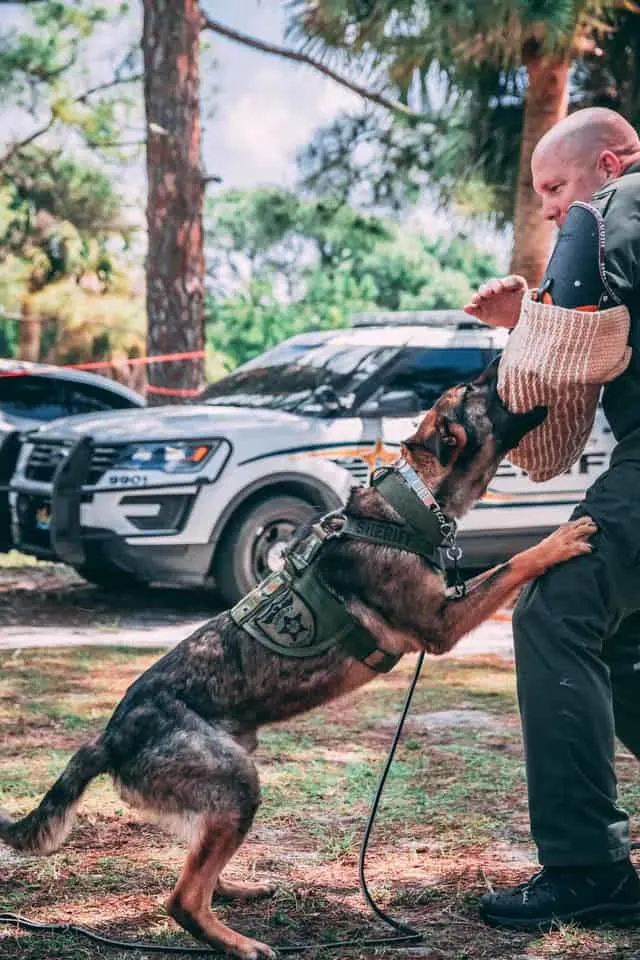
Why Do Police Dogs Use European Commands?
Lots of people might think that the reason why police dogs are given commands in a European language is so the suspect cannot command the dog to back down, but this is not the case.
The reason why police dogs receive commands in a specific European language is that the dogs are often brought over from Europe, which is where they are trained in basic behavior.
So, this would be in the language of their country of origin.
The reason why the command words will be given to the dog in their native tongue is that is makes much more sense for the police officer to learn a few new words in a different language than it would for the dog to have to learn a whole new set of commands in a different language than what they were trained in.
Search and Rescue Training
Dogs that are trained in search and rescue training have the specific objective of finding missing persons, usually in inhospitable environments.
Some of their areas of coverage will include rescue after natural disasters, tracking missing persons, wilderness tracking, and mass casualty events.
An example of a time when search and rescue dogs were used was on September the 11th, 2001, when the attack on the Twin Towers occurred in New York City.
Many first responders attended the scene to help out where they could, but humans were not the only people that responded to the scene. There were also search and rescue dogs present after the towers fell.
These dogs searched through the rubble without hesitations.
Unfortunately, some of these dogs, as well as their handlers, passed away on this day. However, their bravery will be remembered forever.
These search and rescue dogs worked tirelessly to find people on this awful day, and were able to remain focused on the task at hand, despite the dangers that they faced.
One particular dog that you may be interested to learn about is Trakr, which was a search and rescue dog that was able to locate the first survivor to be found.
He worked so hard and selflessly that he collapsed from a combination of smoke inhalation, exhaustion, and burns, after searching non-stop through the rubble for 2 days.
Detection and Explosives Training
You might have heard of certain police dogs that are referred to as sniffer dogs, and these are the dogs that are trained in detection and explosives.
They will be trained to sniff out things like explosives, blood, money, illegal drugs, and even electronic devices. Cadaver dogs will also fit into this category.
Summary
As you now know, German Shepherd dogs make excellent police dogs, and they have a variety of interesting qualities that make them suitable for the job.
These dogs are invaluable assets to police departments, and they help to make a huge difference.
























